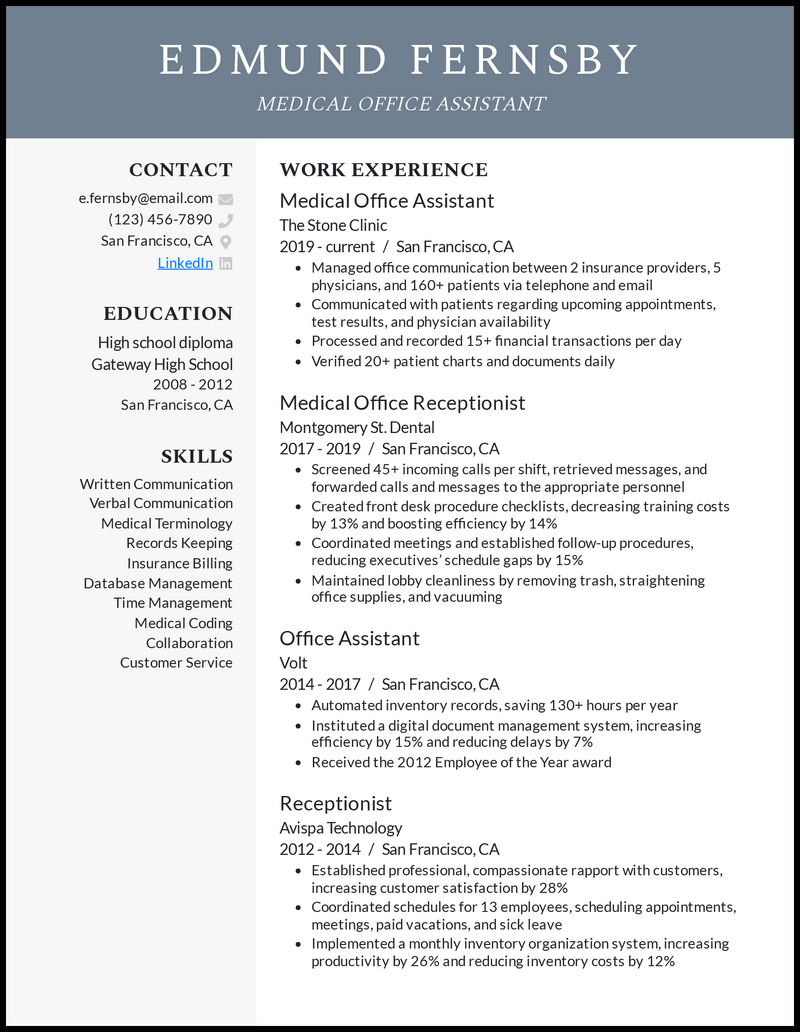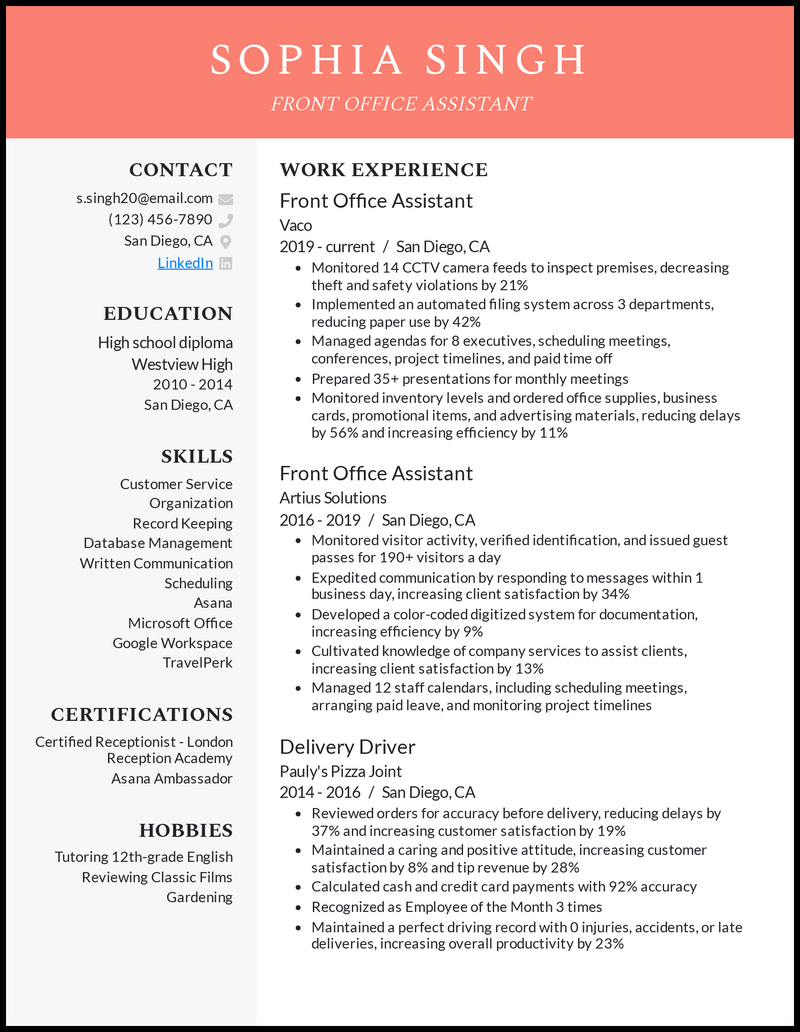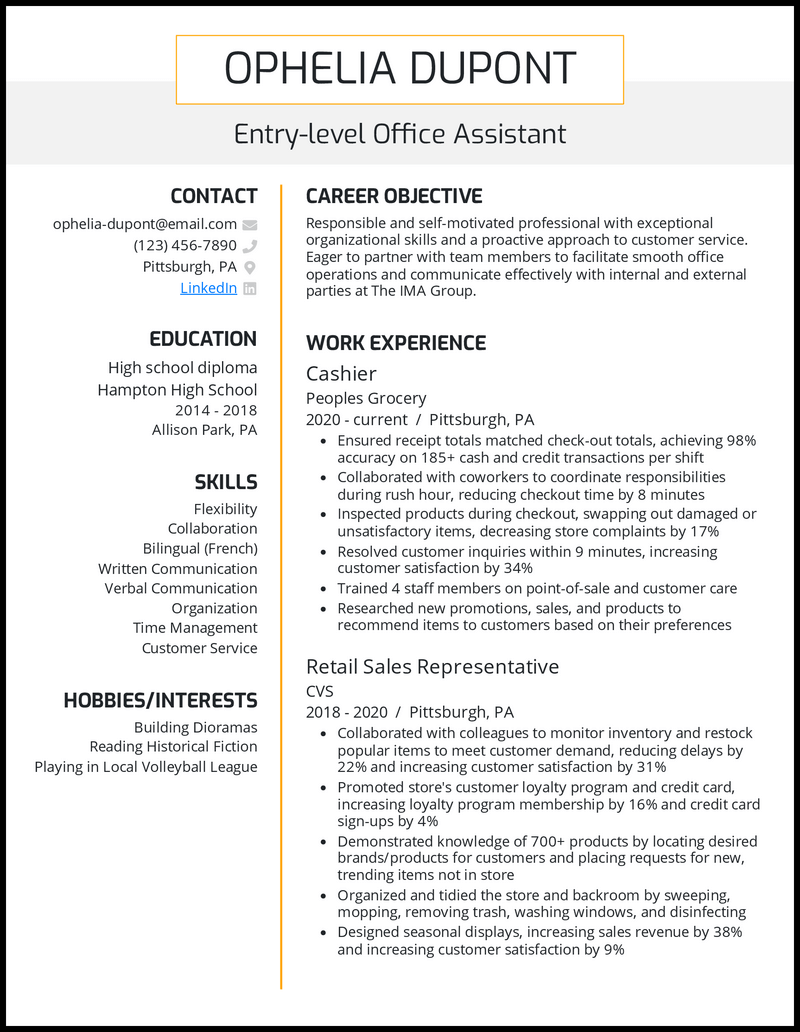
Office Assistant





Best for senior and mid-level candidates
Resume Builder
Like this template? Customize this resume and make it your own with the help of our Al-powered suggestions, accent colors, and modern fonts.
As an office assistant, you’re great at organizing and can communicate effectively with anybody. You’re the champion of calendars, schedules, and office supplies. Your job helps everything run efficiently, and the entire office flourishes when you do your job right.
But to land an office assistant job, your AI cover letter and resume must show the hiring manager that you have what it takes to hold the office together. We’ve researched hundreds of successful resumes and compiled the most effective resume tips to help you land your next interview and, ultimately, your next job.
Take a look at these seven office assistant resume examples, and let us help you build a resume!
Why this resume works
- Even if your office assistant resume has “non-applicable” work experience, that doesn’t mean you won’t get an office assistant position. Although serving at a restaurant is quite a bit different than that of an office assistant, there are plenty of transferrable skills you can use to your advantage.
- When including work experience outside your desired field, highlight strengths and characteristics that make you a good employee, such as teamwork, management abilities, and customer service skills—all of which you can dive into further in your office assistant cover letter.
- If you have over 10 years of experience as an office assistant, you can include a resume summary to highlight your strengths immediately.
- Although you should always include the name of the company you’re applying to and the role you’re seeking, the rest is up to you. We recommend including your years of experience and skillsets, but you can also write a two-to-three sentence narrative of one of your greatest successes.
Why this resume works
- Including a list of applicable skills on your medical office assistant resume helps the hiring manager immediately recognize your abilities.
- When choosing what skills to include, check the job description first. The employer will likely have a host of skills they require from their applicant, and you can pick from their list.
- Of course, only include skills that you actually possess. Lying on your resume isn’t a good way to start a new job!
- When writing your work experience bullet points, start each sentence with a strong action verb.
- Avoid words that don’t mean much, like “helped” or “assisted.” Instead, include direct verbs that relate to your position as a medical office assistant, such as “coordinated,” “communicated,” and “implemented.”
See more medical office assistant resumes >
Why this resume works
- Unlike its long and intimidating name, you don’t need to stress too much over your office assistant administrative assistant resume.
- The deal’s simple: Show you know and have helped teams breeze through their daily administrative tasks. Even something as small as responding to emails will work. Just make sure you’re stating its importance like “Streamlined email communication with the senior management by categorizing and responding to 116+ daily emails, lowering response times by 34%.”
Why this resume works
- If you have any certifications or licenses, include a certifications section to list your proficiencies.
- This is a great way to elevate your front office assistant resume since it shows your dedication to furthering your career and growing your skills.
- Sometimes, depending on the employer, including a hobbies and interests section can heighten your chances of landing an interview.
- It may seem a bit personal, but adding your interests gives employers a sense of your personality and skills in a way that work experience can’t quite accomplish.
- For example, if you like reviewing classic films, hiring managers will conclude you have an analytical mindset and strong communication skills, which are both major green flags.
- Choose your hobbies carefully, though—playing video games might be your favorite pastime, but will it inspire employers to hire you?
- Sometimes it can help to read the company’s website to get a feel for what they value. That way, you can include hobbies you love that also resonate with the employer, boosting your chances of an interview.
Why this resume works
- Proper resume formatting is crucial to landing a senior position, so ensure your senior office assistant resume is perfectly formatted to catch the eye of hiring managers.
- We recommend using the reverse-chronological format to help employers see a timeline of your career.
- No matter how you format your resume, remember that numbers speak loudest when quantifying your accomplishments.
- Include metrics like how many customers you helped, how much your actions improved overall efficiency, and how many calendars you managed, to name a few examples.
Why this resume works
- This isn’t your average office assistant job by any means. Your medical front office assistant resume should include why you’re a great fit in the healthcare industry.
- Prove your worth by adding quantifiable bullet points of the amount of data you’ve organized with precision. Another great addition is to mention how you’ve reduced communication delays using software like TigerNext to improve patient care.
Why this resume works
- Getting an office assistant position with little to no experience can be tricky, but that doesn’t mean your resume can’t stand out. Start by including a resume objective to indicate your determination and knowledge right from the get-go.
- An objective helps you convey your interest and qualifications, but you should only include one if you tailor it to each position to which you apply. A generic objective takes up space that could be used for work experience, so choose wisely.
- Even if you have limited work experience, filling your entry-level office assistant resume is essential.
- Don’t fall into the trap of adding fluff that doesn’t mean much; instead, increase the number of bullet points for each position so you can showcase more of your skills.
How to Write an Office Assistant Resume

Summary
Discover how to craft a job-winning office assistant resume showcasing your value, skills, and achievements to stand out and get hired quickly.
Looking to land that perfect office assistant role? Whichever role you’re applying for, you need a strong office assistant resume that showcases your impact, skills, and value.
Let’s learn how to build a resume that gets you hired by adding section by section.

Kick Off with a resume profile
First impressions last. That’s why your resume profile—taking residence at the top—is your perfect hook.
Make it short and snappy by telling hiring managers who you are and why they should care.
However, there are two types of resume profiles: objective and summary.
- Resume objective: a reserve for entry-level applicants or career changers. It outlines your goals, enthusiasm, and key transferable skills.
- Career summary: This is ideal for experienced professionals to highlight achievements, top skills, and career highlights at a glance.
Entry-level office assistant resume objective
Detail-oriented recent graduate with strong organizational and project coordination skills, seeking an office assistant role at BrightPath Logistics. Completed a data-entry automation project during internship, improving record processing speed by 21%. Passionate about streamlining administrative operations and contributing to team success.
Career summary for experienced office assistant
Proactive office assistant with 6+ years supporting cross-functional teams. Proven ability to reduce office supply costs by 33% at Delta Corp through inventory optimization. Skilled in scheduling, travel coordination, and document management. Dedicated to improving internal workflows and enhancing office productivity.

Spotlight your result-driven work experience
Employers want to see what you can do. Instead of listing responsibilities, generate bullet points to highlight measurable achievements that show your value.
Entry-level office assistant work experience example:
- Organized and digitized over 500 client records using Google Workspace, increasing retrieval speed by 38%.
- Provided front-desk support to 50+ daily visitors, ensuring a professional and welcoming environment.
Experienced office assistant work experience example:
- Coordinated meeting schedules for a team of 17 executives, reducing scheduling conflicts by 41%.
- Implemented a new filing system that halved document retrieval time, boosting team efficiency.

Showcase your skills
The skills section of your resume should hold the prime real estate. It gives recruiters an overview of your capabilities, which is especially important because the applicant tracking system (ATS) will scan your resume first.
Top skills for office assistants:
- Microsoft Office Suite (Word, Excel, Outlook)
- Calendar & Meeting Management
- Data Entry & Filing Systems
- Customer Service
- Communication (Written & Verbal)
- Time Management
- Multitasking
- Attention to Detail
- Office Equipment Handling
- Document Preparation
Tailor your skills to match the job description—and back them up with examples in your experience section.

Include relevant education and certification
There is no need for a master’s degree to be a stellar office assistant, but relevant education and certifications can set you apart—especially when reinforced with real-world skills.
How to list your education
Bachelor of Arts
Business Administration
University of Colorado
Boulder, CO
2019-2023
How to list certifications
Certified Administrative Professional (CAP) — IAAP, 2024
Other great certifications for office assistants
- Microsoft Office Specialist (MOS)
- Administrative Assistant Certification – Penn Foster
- Google Workspace Certification
- Office Management Certification – Udemy or Coursera
- Notary Public Certification (State-based)

Format your resume right
A well-formatted resume shows you’re organized and professional. Use a clean, modern template with clear headings, bullet points, and consistent white spacing. Stick to a reverse chronological format (your most recent experience first), and keep everything to one page if possible.
Your format should include:
- Contact information
- Resume Profile (Objective or Summary)
- Work Experience
- Skills Section
- Education & Certifications
Pro tip: Ensure your file is ATS-friendly—PDF or Word format is usually best.
Office Assistant Resume FAQs

The top skills include administrative support, time management, scheduling, Microsoft Office proficiency, communication, and organizational abilities. For soft skills, add your attention to detail and teamwork, which can be equally valuable.
Craft a killer resume tailored to each job. Then, generate a strong cover letter that shows your personality and passion for the role. Keep track of your jobs, and don’t forget to network—referrals can tip the scale in your favor.
A good objective highlights your skills, goals, and passion, especially if you’re new to the role. It should show how you’ll bring value to the company.
Example:
Recent graduate with skills in Excel, customer service, and scheduling gained from college projects. Seeking an office assistant role at GreenLine Financial to bring efficiency and support to daily operations. Passionate about team collaboration and administrative excellence.
Through a resume, hiring managers can quickly decide whether to bring you in for an interview. A strong resume highlighting your skills, achievements, and value will make you stand out in a sea of applicants.




![7 Office Assistant Resume Examples [& Templates]](https://beamjobs.wpenginepowered.com/wp-content/uploads/2024/05/office-assistant-resume.png)










